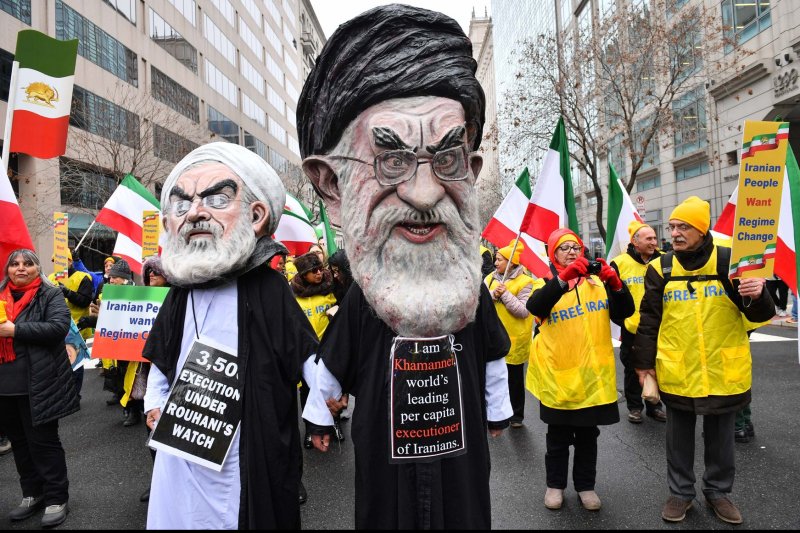Demonstrations participate in a rally held by the Organization of Iranian-American Communities in support of a regime change in Iran, in Washington, D.C., on March 8. Photo by Kevin Dietsch/UPI |
License Photo
March 26 (UPI) -- The Democratic Party in the United States and Iran's global army of apologists who advocate rejoining the 2015 Iran nuclear deal in hopes of moderating the violent, repressive character of the clerical regime in power for the last 40 years would do well to note the political changes underway in Tehran.
Faced with unprecedented unrest at home and a resolute American policy of pushback abroad, Iran's supreme leader Ali Khamenei is doubling down on his regime's policies of persecution, power projection and terror by appointing hard-line loyalists in a bid to ensure that critical state institutions remain faithful to the "principles" of the Islamic Revolution of 1979.
Earlier this month, Khamenei appointed Ebrahim Raisi as head of the judiciary. Raisi, who ran against and lost to Hassan Rouhani in the presidential elections of 2018, earned his stripes as a vicious violator of human rights when he played a leading role in "the summer of blood" -- the 1988 massacre of 30,000 political prisoners.
The recent trip to Iraq of Khamenei's son, Mujtaba, in the company of Iran Revolutionary Guard Corps Quds Force commander Qassim Suleimani suggests that he is being groomed to take on a more prominent public role in the future of Iran. In March 2018, the 92-year-old former Friday prayer leader in Tehran and a harsh critic of the nuclear deal, Ahmad Jannati, was re-elected to chair the Assembly of Experts.
More tellingly, as Banafsheh Keynoush of the Arab Gulf States Institute in Washington points out, Khamenei is spearheading an initiative that his office has dubbed "youth orientation" that is designed to inculcate in Iran's younger generation the ideals of Islamic Revolution. Mohammad Javad Haj Ali-Akbari, a former student of Khamenei, is now Tehran's Friday prayer leader and the youngest Friday prayer imam in Iran. Mohammad Ali Al-e-Hashem, who previously served in the IRGC, is a representative of the supreme leader and now the Friday prayer leader in Tabriz.
The impact of this rightward tilt is clear for all to see. On March 15, the human rights lawyer Nasrin Sotoudeh -- who was awarded the European Parliament's Sakharov Prize for Freedom of Thought in 2012 -- was sentenced to a staggering 38 years in prison and 148 lashes as punishment for defending women being prosecuted for peacefully protesting Iran's compulsory hijab law. She was tried in absentia and denied the right to choose her own lawyer.
The U.S. State Department condemned the sentencing "in the strongest possible terms," calling it "beyond barbaric." Meanwhile, the U.N.'s High Commissioner on Human Rights expressed "shock," despite also acknowledging that it was "emblematic of an increase in the harassment, arrest and detention of human rights lawyers in Iran in recent months."
Human rights lawyers are not the only target. The Tehran regime has also set its sights on other activists and groups who are merely suspected of posing a challenge to the theocratic system. Eight conservationists were arrested last year on unsubstantiated allegations of spying; four of them could face death sentences. Several demographers have also been targeted, apparently in retaliation for research that undermined the regime's efforts to bolster the birthrate and reinforce the official view of women as wives and mothers only.
These arrests come on the heels of a vigorous crackdown on dissent in the wake of mass uprisings that erupted at the end of 2017. In over 160 cities and towns, Iranians from diverse socioeconomic backgrounds called for regime change. Despite a harsh crackdown, during which roughly 8,000 activists have been arrested and 50 shot dead in the streets or tortured in police detention, the protests have continued unabated.
With Raisi now leading Iran's judiciary, the regime has made it clear that it remains committed to the ruthless suppression of dissent. This has implications not only for the future of political protest, but it should also serve as a wake-up call for those advocating engagement with the Islamic Republic. Tehran has no interest in moderating its behavior -- not in response to its own people's demands and certainly not in response to verbal rebukes from Western governments and human rights defenders.
The unrest in Iran is ongoing, and it is unlikely to diminish even in the face of an intensifying regime crackdown. More pressure, not less, is the only policy that will produce meaningful, lasting change in Iran. Inside and outside the country, Iranians are organizing and acting. Groups like the National Council of Resistance of Iran and others reject the government's policies of repression at home and aggression abroad. They call for the separation of religion and state, freedom of expression, free and fair elections based on universal suffrage and an end to the nuclear program. And they deserve our support.
As the spotlight continues to shine on Iran's stunning disregard for human rights, we must hope that policymakers will come to understand that their actions will play a critical role in protecting the Iranian people and the credibility of Western democracies.
Adam Ereli has served as U.S. ambassador to the Kingdom of Bahrain and as deputy spokesman of the U.S. Department of State.















